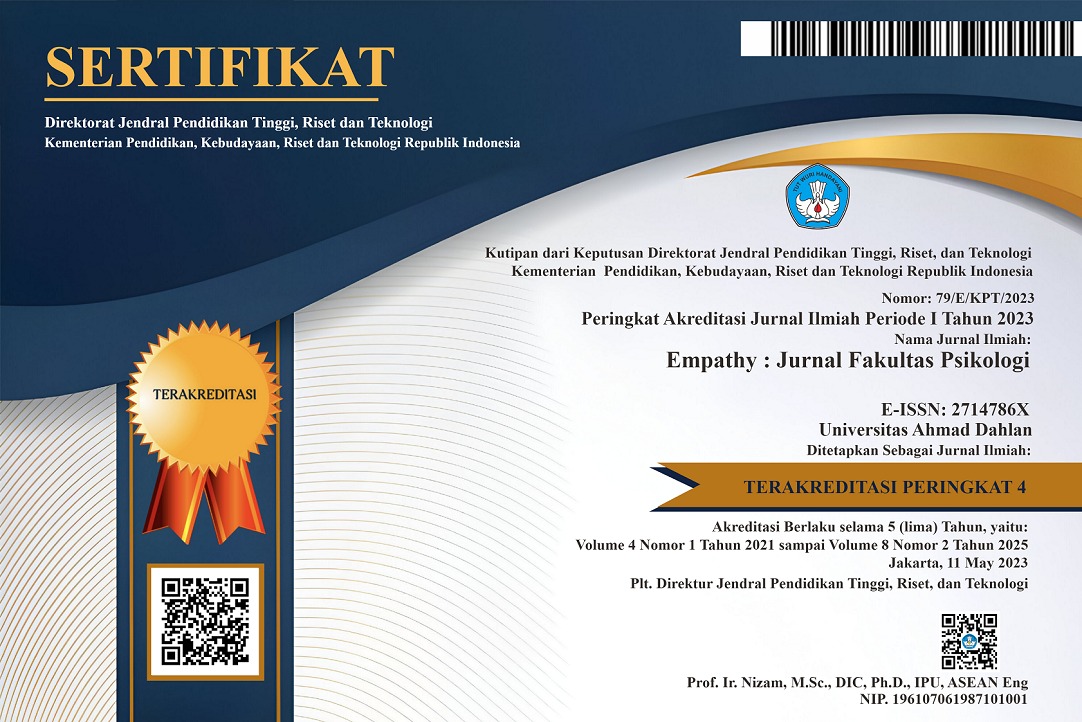Flow Akademik Ditinjau dari Persepsi Kompetensi Akademik dan Dukungan Guru pada Siswa SMA
DOI:
https://doi.org/10.12928/empathy.v4i2.22024Keywords:
academic flow, teacher support, perceived academic competenceAbstract
Academic Flow in Terms of Perceived Academic Competence and Teacher Support for High School Students
Â
Academic flow has a very important role in the field of education to increase academic success. This study aims to examine the relationship between perceived academic competence and teacher social support with academic flow. The subjects of this study were all 92 students of SMA "X" in Musi Banyuasin district. The research method used is quantitative, data collection tools in the form of a psychological scale and data analysis using multiple regression analysis techniques with the help of the IBM SPSS for windows 21.0 computer program. The analysis results show a correlation coefficient (r) of 0.292 and a significance level (p) of 0.005 (p< 0.01) so it can be concluded that there is a very significant positive relationship between perceived academic competence and teacher support with academic flow. The higher the perceived academic competence felt by students, the higher the academic flow. The higher the teacher support received, the higher the academic flow and conversely the lower the perception of competence felt by students, the lower the academic flow as well as teacher support, the lower the teacher support received by students, the lower the academic flow. The effective contribution given by each variable to the academic flow is from the perceived academic competence by 62%, while from teacher support it is 12.3% and the remaining 25.7% is influenced by other factors.References
Aini, N. Q., & Fahriza, I. (2020). Flow akademik pada pendidikan. Jurnal Dinamika Pendidikan, 13(3), 369-376.
Al Farabi, A., Putri, S., & Tri, D. (2017). Religiusitas dengan flow akademik pada siswa. Jurnal Psikologi Islam. 3(2),145-154. https://doi.org?10.19109/psikis.v3i2.1759.222.
Amira, R. D. & Muhid, A. (2020). Self regulated learning, self esteem, dukungan sosial dan flow akademik. Jurnal Indonesia Psychological Research, 2(2), 65–74. https://doi.org/10.29080/ipr.v2i2.393
Baumann, N., & Scheffe R, D. (2010). Seeking flow in the achievement domain: The achievement flow motive behind flow experience. Journal Motivation and Emotion, 35 (3), 267-284. https://doi.org/10.1007/s11031-010-9195-4.
Broussard, S. C., & Garrison, M. E. B. (2004). The relationship between classroom motivation and academic achievement in elementary-school-aged children. Family and Consumer Sciences Research Journal, 33(2), 106–120. https://doi.org/10.1177/1077727X04269573.
Depdiknas, (2004). Kurikulum pendidikan dasar. Jakarta: Departemen Pendidikan Nasional.
Fanggidae, Y. M., & Radja, M. D. (2020). Teacher's social support as a predictor motivation of student achivements. Jurnal PAJAR (Pendidikan dan Pengajaran) 4(4), 11-19.
Ferla, J., Valcke, M., & Schuyten, G. (2010). Judgments of self-perceived academic competence and their differential impact on students achievement motivation, learning approach, and academic performance. European Journal of Psychology of Education, 25(4), 519–536. https://doi.org/10.1007/s10212-010-0030-9.
Hidayati, N. & Aulia, L. A. (2019). Flow akademik dan prokrastinasi akademik. Jurnal Psikologi, 6(2), 128–144.
Jannah, E. R. (2020). Analisis korelasi self efficacy dan flow akademik dengan prestasi belajar pendidikan agama islam di sekolah menengah kejuruan yayasan pendidikan maarif 5 Sukodono Sidoarjo. Jurnal Pendidikan dan Studi Keislaman, 10(1), 17-26.
Kristanti, E., & Sari, N. P. (2021). Motivasi berprestasi, dukungan sosial dan flow akademik siswa di era covid-19. Jurnal Cakrawala Ilmiah, 1(2), 187-200.
Mufidah, L. N. (2017). Memahami gaya belajar untuk meningkatkan potensi anak. Jurnal Perempuan dan Anak. 1(2), 246-260.
Mustoip, S., Japar, M., & MS, Z. (2018). Implementasi pendidikan karakter. Surabaya: CV Jakad Publishing.
Neemann, j., & Harter, s. (2012). Self -perception profile for college students : Manual and questionnaires. Denver CO, Univeristy of Denver, Department of Psychology.
Novianti K.T, Hidayati F., & Setyowati, R. (2020). Relation between social support and commitment to task with academic flow to student. Jurnal Kajian Psikologi Pendidikan dan Bimbingan Konseling, 6(1), 21-28.
Pajares, F. (1997). Current directions in self-efficacy research. Advances in Motivation and Achievement, 10 (149), 1–49.
Pandjaitan, L, N., Listyo,Y.,& Kristianto, B. (2017). Pembelajaran flow bagi siswa berkebutuhan khusus. Surabaya: Pustaka Jaya.
Prihandrijani, E. (2016). Pengaruh motivasi berprestasi terhadap flow akademik pada siswa SMA X di Surabaya. Tesis. Fakultas Psikologi Universitas Airlangga, Surabaya.
Prihastyanti, I. & Sawitri, D. R. (2018). Dukungan guru dan efikasi diri akademik pada siswa SMA Semesta Semarang. Jurnal Empati. 7(3),33-46.
Salanova, M., Bakker, A. B., & Llorens, S. (2006). Flow at work: Evidence for an upward spiral of personal and organizational resources. Journal of Happiness Studies, 7(1), 1–22. https://doi.org/10.1007/s10902-005-8854-8.
Sarafino, E. P., & Smith, T. W. (2010). Health psychology : Biopsychosocial interactions (7th ed). Amerika Serikat: John Wiley & Sons, Inc.
Sumaya, I. C., & Darling, E. (2018). Procrastination, flow, and academic performance in real time using the experience sampling method. Journal of Genetic Psychology, 179(3), 123–131. https://doi.org/10.1080/00221325.2018.1449097
Tamba, W.M., Manalu, H., Manurung, L., & Sembiring, R. K. (2019). Menganalisis pengaruh penerapan full day school terhadap minat belajar matematika siswa di SMA Primbana Medan. Jurnal Math Education Nusantara, 2(2), 113–119.
Thohiroh, H., Novianti, L. E., & Yudiana, W. (2019). Peranan persepsi dukungan sosial terhadap kesejahteraan subjektif di sekolah pada siswa Pondok Pesantren Modern. Jurnal Ilmiah Psikologi, 6(2), 131-144.
Downloads
Published
Issue
Section
License
Authors who publish with Empathy: Jurnal Fakultas Psikologi agree to the following terms:
- Authors retain copyright and grant the journal right of first publication with the work simultaneously licensed under a Creative Commons Attribution License (CC BY-SA 4.0) that allows others to share the work with an acknowledgment of the work's authorship and initial publication in this journal.
- Authors are able to enter into separate, additional contractual arrangements for the non-exclusive distribution of the journal's published version of the work (e.g., post it to an institutional repository or publish it in a book), with an acknowledgment of its initial publication in this journal.
- Authors are permitted and encouraged to post their work online (e.g., in institutional repositories or on their website) prior to and during the submission process, as it can lead to productive exchanges, as well as earlier and greater citation of published work.

This work is licensed under a Creative Commons Attribution-ShareAlike 4.0 International License.



